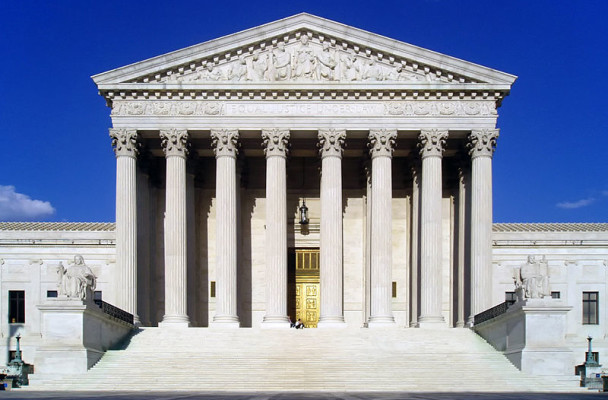Supreme Court Denies Review of Widow’s Black Lung Benefits Award Under § 932(l) (Peabody Coal Co. v. Director, OWCP [Hill])

Yesterday, the U.S. Supreme Court denied review in a black lung case that Peabody Coal asked the Court to review. In Peabody Coal Co. v. Director, OWCP [Hill] (S. Ct. No. 14-1278), Peabody Coal argued that Eva Elizabeth Hill’s award of black lung benefits violated the U.S. Constitution. The Supreme Court declined to consider Peabody Coal’s arguments, leaving intact the Sixth Circuit’s decision affirming Mrs. Hill’s award of benefits. (see previous post here discussing last year’s Sixth Circuit decision in Mrs. Hill’s case.)
(Disclosure: Stephen A. Sanders and I of Appalachian Citizens’ Law Center represented Mrs. Hill before the Supreme Court.)
Mrs. Hill’s award was based on the “automatic entitlement” provision at 30 U.S.C. 932(l) that was revived in 2010 by the Affordable Care Act. This provision allows certain survivors of a coal miner who was determined to be eligible to receive black lung benefits to derivative survivors’ benefits without having to prove that the miner died due to pneumoconiosis. In other words, when a miner who is receiving black lung benefits dies, then his eligible survivors’ (usually his widow, but sometimes his children) need merely fill out a simple form to begin receiving benefits in their own name.
The issue in Mrs. Hill’s case is that she had a previous survivor’s claim from 2000 that was denied because the ALJ did not find her evidence sufficient to prove that Mr. Hill died due to his black lung. Mrs. Hill appealed this denial, but it was ultimately affirmed in 2004 by the U.S. Court of Appeals for the Sixth Circuit, which said that the ALJ’s denial was based on substantial evidence. Hill v. Peabody Coal Co., 94 F. App’x 298 (6th Cir. 2004).
In 2011, after the Affordable Care Act was passed, Mrs. Hill filed a subsequent claim.
The U.S. Courts of Appeals have uniformly held that a previous denial does not prevent an eligible survivor from filing a new claim under 932(l). (See previous posts here, here, and here)
However, Peabody Coal argued that Mrs. Hill’s situation is different because her denial was affirmed by an Article III court (i.e., the U.S. Court of Appeals for the Sixth Circuit which is formed under Article III of the U.S. Constitution as opposed to the Department of Labor’s adjudicatory bodies which are formed under Article I of the U.S. Constitution). Peabody Coal’s argument was based on the Supreme Court’s decision in Plaut v. Spendthrift Farm, Inc., 514 U.S. 211 (1995), a case holding that Congress violated the Constitution’s separation-of-powers principle by reopening securities class actions that Article III courts had held were untimely.
As explained in our Brief in Opposition to review (embedded below), we disagree with Peabody Coal’s argument. In short, we think that Plaut contains multiple important exceptions that allow for awards in subsequent black lung claims. The Department of Labor’s Director, OWCP also disagreed for similar reasons and its Brief in Opposition is available here.
Regardless of what we think though, the important thing is that in August 2014, the Sixth Circuit affirmed Mrs. Hill’s award against Peabody Coal’s challenges via a panel decision. Peabody Coal sought en banc review by the entire Sixth Circuit, but not a single judge out of 15 (the 15 active judges minus Judge Boggs who recused himself, plus Senior Circuit Judge Daughtrey who was a part of the panel) voted in favor of review. (It is worth noting that two judges—Sutton and Kethledge—wrote a highly unusual “concurring” opinion in which they essentially argued that the uniform interpretation of the U.S. Courts of Appeals on subsequent 932(l) claims is wrong, but that full court review is not necessary.)
Peabody Coal then sought review by the U.S. Supreme Court, its last hope to challenge Mrs. Hill’s award.
However the Supreme Court declined to hear the case. This means that Peabody Coal did not get 4 out of the 9 Justices to vote in favor of reviewing the case. The Supreme Court followed its usual practice and did not include any explanation for its denial of review.
As a result of the Supreme Court’s denial of review, the August 2014 Sixth Circuit decision stands and the state of the law remains the same: eligible survivors can file subsequent claims under 932(l), even if they had a prior denial—and even if the denial was affirmed by an Article III court.
Unfortunately, Mrs. Hill passed away while her case was pending before the U.S. Supreme Court. Her perseverance in fighting for her widow’s benefits for over 15 years created precedent that should make the pursuit of black lung benefits less of a struggle for other widows going forward.
—
Peabody Coal Co. was represented by Mark Solomons and Laura Metcoff Klaus of Greenberg Traurig LLP.
Mrs. Hill was represented before the Supreme Court by Robert M. Loeb and Jeremy R. Peterman of Orrick, Herrington & Sutcliffe LLP as well as Stephen A. Sanders and me of Appalachian Citizens’ Law Center, Inc. (Mrs. Hill was generally not represented below although Brent Yonts of Greenville, Kentucky previously represented her.)
The Director, OWCP was represented by the Solicitor General (Donald B. Verrilli, Jr.) as well as attorneys from the Department of Labor’s Solicitor’s office (M. Patricia Smith, Rae Ellen James, Gary K. Stearman, and Barry H. Joyner).
Peabody Coal v. Director, OWCP [Hill] – Brief in Opposition to Certiorari
One Response to “Supreme Court Denies Review of Widow’s Black Lung Benefits Award Under § 932(l) (Peabody Coal Co. v. Director, OWCP [Hill])”
[…] widow’s case and briefed at the certiorari stage before the Supreme Court, see previous post here about Peabody Coal Co. v. Director, OWCP […]
Comments are closed.